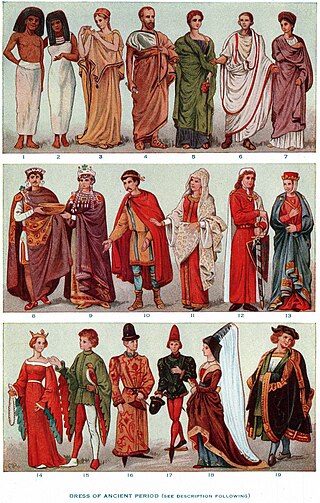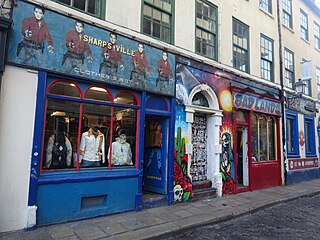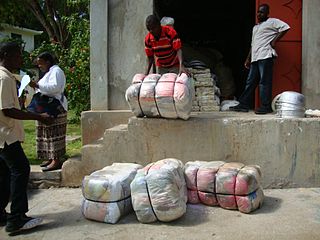Related Research Articles

Clothing is any item worn on the body. Typically, clothing is made of fabrics or textiles, but over time it has included garments made from animal skin and other thin sheets of materials and natural products found in the environment, put together. The wearing of clothing is mostly restricted to human beings and is a feature of all human societies. The amount and type of clothing worn depends on gender, body type, social factors, and geographic considerations. Garments cover the body, footwear covers the feet, gloves cover the hands, while hats and headgear cover the head, and underwear covers the private parts.

A sweatshop or sweat factory is a crowded workplace with very poor or illegal working conditions. The manual workers are poorly paid, work long hours, and experience poor working conditions. Some illegal working conditions include poor ventilation, little to no breaks, inadequate work space, insufficient lighting, or uncomfortably or dangerously high or low temperatures. The work may be difficult, tiresome, dangerous, climatically challenging, or underpaid. Workers in sweatshops may work long hours with unfair wages, regardless of laws mandating overtime pay or a minimum wage; child labor laws may also be violated. Women make up 85 to 90% of sweatshop workers and may be forced by employers to take birth control and routine pregnancy tests to avoid supporting maternity leave or providing health benefits.

A reseller is a company or individual (merchant) that purchases goods or services with the intention of selling them rather than consuming or using them. Individual resellers are often referred to as middle men. This is usually done for profit. One example can be found in the industry of telecommunications, where companies buy excess amounts of transmission capacity or call time from other carriers and resell it to smaller carriers. Resale can be seen in everyday life from yard sales to selling used cars.

Used goods, also known as secondhand goods, are any item of personal property offered for sale not as new, including metals in any form except coins that are legal tender, but excluding books, magazines, and postage stamps. Used goods may also be handed down, especially among family or close friends, as a hand-me-down.

African clothing is the traditional clothing worn by the people of Africa.

Vintage clothing is a generic term for garments originating from a previous era, as recent as the 1990s. The term can also be applied in reference to second-hand retail outlets, e.g. in vintage clothing store. While the concept originated during World War I as a response to textile shortages, vintage dressing encompasses choosing accessories, mixing vintage garments with new, as well as creating an ensemble of various styles and periods. Vintage clothes typically sell at low prices for high-end name brands.

Fast fashion is the business model of replicating recent catwalk trends and high-fashion designs, mass-producing them at a low cost, and bringing them to retail quickly while demand is at its highest. The term fast fashion is also used generically to describe the products of this business model, particularly clothing and footwear. Retailers who employ the fast fashion strategy include Primark, H&M, Shein, and Zara, all of which have become large multinationals by driving high turnover of inexpensive seasonal and trendy clothing that appeals to fashion-conscious consumers.

Sustainable fashion is a term describing efforts within the fashion industry to reduce its environmental impacts, protect workers producing garments, and uphold animal welfare. Sustainability in fashion encompasses a wide range of factors, including cutting CO2 emissions, addressing overproduction, reducing pollution and waste, supporting biodiversity, and ensuring that garment workers are paid a fair wage and have safe working conditions.
Mitumba is a Swahili term, literally meaning "bundles", used to refer to plastic-wrapped packages of used clothing donated by people in wealthy countries. The term is also applied to the clothing that arrives in these bundles.

The first communities of the Greeks in the Democratic Republic of the Congo were established prior to Belgian colonization. The Greek presence reached a peak in the 1950s when many Greeks fled Egypt following the revolution of 1952. The Greek communities organized their own schools and churches and Greeks were active in trade, fishing, transport, coffee growing and the music industry. Also, a small group of Greek Jews emigrated to the Congo in the early 20th Century.

The SWAP Team is a Canadian non-profit organization that facilitates large-scale clothing swaps partnered with local charities that accept the leftover clothing at the end of the swap. The organization has established chapters across Canada, and in the United States, Australia, and Switzerland. Collectively, the chapters have donated more than 18,000 garments to its charity partner, the Salvation Army.

The global trade of secondhand clothing is a long-standing industry, which has been facilitated by the abundance of donated clothing in wealthy countries. This trade accounts for approximately 0.5% of the total value of clothing traded worldwide, while by weight it accounts for 10%. However, in some countries, imported used clothing constitutes the majority of clothing purchased and used.

Beatrice "Betty" Kaunda was a Zambian educator and inaugural First Lady of Zambia from 1964 to 1991 as the wife of the country's first president, Kenneth Kaunda. She was known as Mama Betty Kaunda and the Mother of Zambia by Zambians.
Vahan Chamlian, was an American-Armenian philanthropist and businessman, and the world's largest dealer of secondhand clothes.
The following is a timeline of the history of the city of Lusaka, Zambia.

Clothing industry or garment industry summarizes the types of trade and industry along the production and value chain of clothing and garments, starting with the textile industry, embellishment using embroidery, via the fashion industry to apparel retailers up to trade with second-hand clothes and textile recycling. The producing sectors build upon a wealth of clothing technology some of which, like the loom, the cotton gin, and the sewing machine heralded industrialization not only of the previous textile manufacturing practices. Clothing industries are also known as allied industries, fashion industries, garment industries, or soft goods industries.
USAgain is a for-profit textile recycling company operating in the United States. USAgain operates green and white collection bins in partnership with businesses, schools, and places of local government. The company was founded in Seattle in 1999 and has since expanded to over 10,000 collection sites in 15 states. USAgain is now headquartered in West Chicago, IL.

BeGood Clothing is a retailer of clothing and accessories, selling its products online and focused on socially responsible clothing. The company is based in San Francisco, California. BeGood Clothing advances its mission as a socially responsible brand mainly through two initiatives: (i) the company features sustainable fashion and gifts that are eco-friendly, and (ii) the company gives back to an environmental or humanitarian cause for each item purchased. The company supports local San Francisco nonprofits, participates in charitable events, and donates customers’ gently used clothing to Goodwill Industries monthly.

Slow fashion is an aspect of sustainable fashion and a concept describing the opposite to fast fashion, part of the "slow movement" advocating for clothing and apparel manufacturing in respect to people, environment and animals. As such, contrary to the industrial practices of fast fashion conglomerates, slow fashion involves local artisans and the use of eco-friendly materials, with the goal of preserving crafts and the environment which, ultimately, provides value to all, slow fashion brands, consumers and retailers.

Vintage clothing "Vintage" is a colloquialism commonly used to refer to all old styles of clothing. A generally accepted industry standard is that items made between 20 and 100 years ago are considered "vintage" if they clearly reflect the styles and trends of the era they represent. In recent years, the popularity of vintage clothing has grown, as consumers seek unique and sustainable fashion options.
References
- ↑ Durham, Michael (25 February 2004). "The journey of a blouse donated to charity". The Guardian.